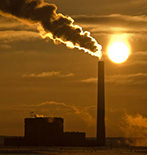Access to abundant, affordable energy is a key factor in economic growth, whether supplying the manufacturing plants of the 20th century or the server farms of the 21st century. Unfortunately, the federal government has placed unreasonable restrictions on domestic exploration and development, and foreign sources are sometimes actually hostile to our own interests.
New discoveries and innovative technologies have made possible the extraction of enormous new energy resources within the United States. The U.S. possesses not only enormous natural energy resources but also the technology to extract those resources in a responsible manner.
IPI believes that the United States should become as energy self-sufficient as possible, drawing upon a diverse energy base comprised of all possible energy resources. We believe that free people operating within a free economy using voluntary risk capital will out-innovate government-directed central planning funded by taxpayer dollars. The key to energy innovation is abundant capital, a tax system that rewards rather than punishes success, an intellectual property system that allows innovators to own the fruits of their research, and a regulatory environment that balances the needs of our economy with the protection of the environment.
Wind Production Tax Credit Imposes High Costs
U.S. taxpayers have been subsidizing wind energy for decades. The primary focus of that subsidy has been the Production Tax Credit, which ended in 2013. But powerful forces want to reinstate the PTC, even though wind energy imposes huge costs on ratepayers and taxpayers at a time when fossil-fuel generated electricity is getting cheaper and cleaner.
Should new GOP Congress rescind EPA's 54.5 mpg mandate for 2025 models?
Like so many of the administration’s reforms, this one is imposed by executive fiat rather than approved by Congress—and the incoming Republican Congress should try to roll it back.
Stopping the Wind PTC Zombie Apocalypse
Congress should pass an extenders package and resolve to move on fundamental tax reform during the next Congress. But that package should not include the PTC.
Critics: Fracking ban unconstitutional
A pair of Burns Town Board members opposed to a potential fracking ban have sent The Evening Tribune Merrill Matthews' article from the Aug. 1, 2014 edition of The Wall Street Journal saying, “The Fifth Amendment to the U.S. Constitution says, in part, that private property cannot be taken for public use ‘without just compensation.' Government regulations that substantially reduce the value of an owner’s property may also constitute a taking.
What Obama Won't Tell You About U.S. Carbon Emissions
President Obama likes to trash the U.S. as a top polluter, but by some measurements the U.S., as the world's economic engine, does very well.
Energy Issues Were a Big Win In Last Week's GOP Wave
While the economy may have been voters' primary concern and the president's health care law second, energy issues played a key role, especially in those states that gave Republicans control of the Senate.
Denton Fracking Ban Passes, But For How Long?
"The ban is extremely precarious from a legal standpoint," said Tom Giovanetti. "This was Act 1 last night. And the next few acts are going to take place in the courts."
Outside Money Flows Into Denton Fracking Debate
Giovanetti said there also could be a potential economy loss of up to $250 million over the coming decade.
The Company Behind the Keystone XL Pipeline Wins an Environmental Award
TransCanada, the Canadian company behind the Keystone XL pipeline, was just recognized for its pro-environment efforts; so what's President Obama's excuse for not approving it now?
Fracking Ban Vote Is Much Bigger Than Denton
If Denton bans drilling and the state were to decline to override the vote, the courts could require the city to compensate mineral rights owners for their lost royalties. But don’t expect the environmentalists to spend much time talking about those costs.








